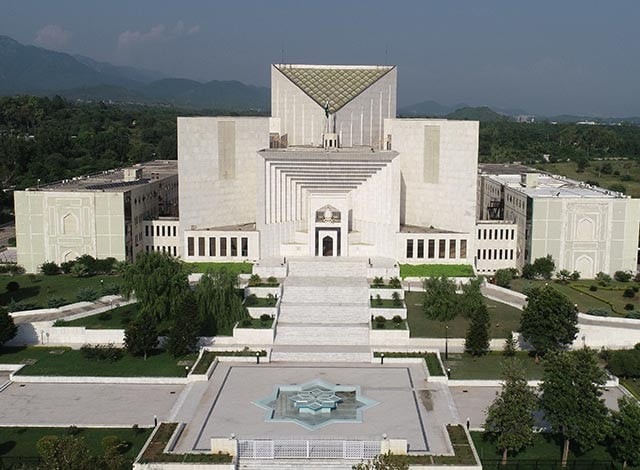Judiciary’s approach towards PTI changing?
Granting of bail to five people allegedly involved in May 9 riots triggers debate

Following the granting of bail to five people allegedly involved in last year’s May 9 violence, a debate has set off as to whether or not a breeze of change had begun to blow through the superior courts towards the PTI.
The party has been unable to acquire relief from the superior judiciary, especially the Supreme Court, during the tenure of Chief Justice of Pakistan Qazi Faez Isa.
The majority of the accused involved in the May 9 mayhem could not receive bail from the high courts -- the Lahore High Court in particular.
A larger bench of the apex court led by Justice Ijazul Ahsan on October 23, 2023 declared that the trial of civilians in military courts was “unconstitutional”.
Of the five judges on that bench, four of them belonged to ex- CJP Umar Ata Bandial's camp.
Subsequently, the government challenged the larger bench’s judgment. It was suspended by another larger bench led by Justice Sardar Tariq Masood.
The bench even conditionally allowed the trial of civilians in military courts until the final decision on the government’s intra court appeals against the earlier judgment.
Later, Justice Masood on January 29 recused from the bench hearing the government’s intra-court appeals as the petitioners raised objections about him.
Since Justice Masood’s recusal, a new bench is yet to be formed even though some applications have been moved for the early hearing of the case.
However, another SC bench led by Justice Jamal Khan Mandokhail has given important observations in the matter of bail related to the accused involved in the May 9 riots.
Similarly, Islamabad High Court’s Justice Babar Sattar has convicted the Islamabad deputy commissioner and others in a contempt case for repeatedly issuing and executing successive detention orders issued against PTI leader Shehryar Afridi.
Another division bench of the IHC led by its Chief Justice Aamer Farooq is raising questions on the manner in which the trial of PTI founding chairman and former premier Imran Khan was conducted in the cipher case.
Despite the executive’s restrictions, the IHC also allowed PTI lawyers to hold meetings with Imran.
It has also been learnt that during a full court meeting at the LHC, one judge called for the improvement of the high court's image.
The PTI’s female activists, who are accused in the May 9 riots, are still behind bars.
Advocate Abdul Moiz Jaferii said there was a growing sense in both the bar and bench that a measure of credibility in the judiciary must be restored.
Read Imran named primary accused in May 9 riots
“At no point since the lawyers movement has the judicial system been less relevant to the national political equation than it is today,” he added.
Jaferii continued that the orders are passed by the top court.
“If they [orders] are disliked, they are ignored. Benches are formed that ignore this past ignorance and suspend their own earlier orders without consequences. We have brought ourselves here. We must take ourselves out [of this situation].”
Another senior lawyer was of the view that the superior courts had adopted the approach of “judicial silence” for the last six months.
“There is a perception that courts are becoming irrelevant as state institutions have been given a free hand to deal with matters related to civil liberties,” he added.
“Since the new government has been formed, there will be a change in the judges’ approach to adjudicate politically sensitive matters.”
However, the senior lawyer believed that there would not be a major shift in the judiciary's policy.
First, he pointed out that the chief justices of the constitutional courts were crucial in challenging the status quo.
Secondly, he observed that the judges, who were questioning the executive’s policy towards the May 9 violence, were not in the driving seat.
“The composition of benches is always important to deal with high-profile cases.”
Another lawyer said it seemed the executive authorities were not rigorously pleading cases related to the May 9 mayhem after the February 8 general elections.
During the caretaker government’s tenure, the superior courts adopted judicial restraint on the state institutions policy towards the May 9 riots.
He said the PTI was already facing internal differences and now it was no longer a major threat for the ‘powerful circles'.
“Therefore, now it won’t make a major difference if the PTI acquires some relief from the courts.”



















COMMENTS
Comments are moderated and generally will be posted if they are on-topic and not abusive.
For more information, please see our Comments FAQ